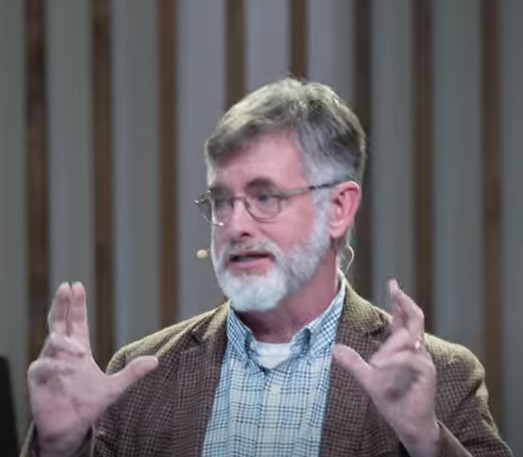A scene from The Canterbury Psalter (12th century)
Blog
Proportional Blessing

When I guest preach in a brand new place, it’s likely to be on Ephesians 1:3-14. I’ve lived in that passage long enough that I know what I’m doing in there, I’ve studied every word, and I have a good sense of where everything is. I can reach into it and bring out the parts that I think will speak to this congregation. I feely admit that my Ephesians 1 sermon is what some traditions call a “sugar stick” sermon. But I also never tire of it, and there’s always something new in it for me.
I recently spoke at Sovereign Hope in Missoula (Hi Fongs! Hi Tyler!), and as I unfolded the riches of Ephesians 1 this time and explored the meaning of “every spiritual blessing,” I found something new. I’m not sure what to call it, but it has something to do with proportionality, or with the way the economy of salvation is open toward us on one side and toward God on the other. It’s a gasket, ensuring a snug alignment between two unequal things. The economy (oikonomia, 1:10) is fitting for us, but it is also fitting for God; it is a God-appropriate salvation that is also custom fitted to our needs.
One way I gestured toward that early in the sermon is by quoting R.A. Torrey’s remarks about God blessing us “according to the riches of his grace.” (Eph 1:7). Torrey notes that God doesn’t just bless us from the riches of his grace, but according to them. That is, it’s not just that God has a lot of grace units, some of which he gives us. Instead, Ephesians says that God has riches of grace, and what he gives us is measured by, or somehow proportionate to, that richness. As Torrey asked, would you rather a millionaire give you money from his millions, or according to his millions? Ten or twenty bucks might be from his millions; but a gift according to his wealth would be appropriately impressive.
This is an initial glance at how the great blessing of Ephesians 1 is a middle thing, a proportional thing where God meets us according to who he is and who we are.
Here’s how I put it after talking about the past-present-future structure of the blessing:
This comprehensive, all-embracing, history-spanning salvation is what we need as creatures who live in time: salvation that starts before we do, that we run the whole way with, that we won’t outlast. A blessing this big, this chronologically comprehensive, is appropriate to us as creatures. It stretches out through time, through our time.
But it is also appropriate to who God is: as the Alpha, the Omega, and the Everythinginbetweena; the one who was, and is, is to come; as Jesus Christ, the same yesterday, today, and forever.
God blessing us “with every spiritual blessing in the heavenly places in Christ” is appropriate to our deep neediness, but even more than that, it’s appropriate to God’s great glory.
The great blessing of salvation fits our needs: it is custom made for us, and we are custom made for it. But this great blessing again and again invites us to lift up our eyes to something even greater: this blessing fits God; it is a blessing that is appropriate to God’s greatness, his fullness, as the fountain of all blessing.
Well, as you can tell, I’m repeating myself. But there’s something here that I haven’t yet seen to the bottom of, and it has to do with proportionality, with a matched and measured salvation that glorifies God and rescues humanity. If there’s a name for it, and others have written about it under that name, drop me a note and let me know.
It may even be that “blessing” in Ephesians is not makarios but eulogetos, to speak well of. Salvation speaks well of the God of salvation; blessed be God who has blessed us.
Here’s the full sermon, if you’re interested:
About This Blog

Fred Sanders is a theologian who tried to specialize in the doctrine of the Trinity, but found that everything in Christian life and thought is connected to the triune God.


